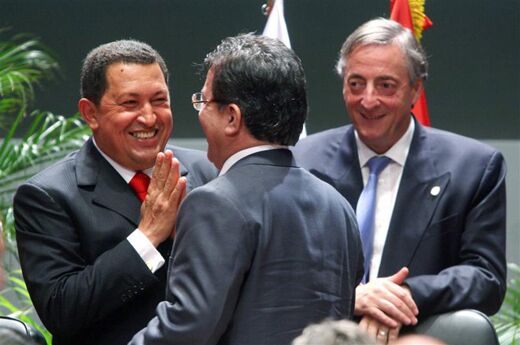
Venezuela Joins Mercosur
On July 3, one of the most virulently anti-American countries in Latin America was officially inducted into the South American trade bloc Mercosur.
Adding Venezuela—the world’s fifth-largest oil exporter—to Argentina, Brazil, Paraguay and Uruguay will boost the bloc’s gross regional product to more than $1 trillion. With the trade bloc now accounting for 75 percent of the region’s total economic activity and comprising 65 percent of South America’s population, Mercosur’s economic weight will certainly increase.
But of perhaps more significance is the fact that this expansion in Mercosur membership characterizes Latin America‘s swing away from the U.S.
For years, the United States has been trying to establish a Free Trade Area of the Americas (ftaa) encompassing both American continents. In response, the nations of Latin America have closed ranks and progressively worked to form their own trade agreements in defiance of the U.S. Now, Mercosur’s acceptance of Venezuela as a full member—hailed by Chavez as a victory over America’s ftaa push—is a bold move in this direction.
Venezuela’s addition “seems to be going counter to what the U.S. wants to accomplish,” said Masaaki Kotabe at Temple University’s Fox School of Business. “It points toward a failing U.S. policy” (Associated Press, July 3; emphasis ours).
This is certainly the way Venezuelan President Hugo Chavez sees it. In many ways, Venezuela has taken the lead in fostering an anti-American spirit in Latin America. Chavez rails against the U.S. at every opportunity and has made a point of cultivating relationships with other countries hostile to America such as Cuba and Iran. Chavez now claims the acceptance of Venezuela into Mercosur as “a victory against Washington’s ‘imperialistic’ economic plans for the hemisphere.”
In accepting Venezuela as a member with full voting rights, Mercosur is bound to adopt a stance even more at odds with the U.S. The way Chavez looks at it, the alliance “should be a common front against U.S. free-trade deals” (Associated Press, July 5).
The other Mercosur members would certainly be aware that Venezuela recently withdrew from the Andean trade bloc—consisting of Bolivia, Colombia, Ecuador and Peru—in protest of those countries having trade agreements with the U.S. Presumably, by accepting Venezuela—which has the third-largest economy on the continent—Mercosur doesn’t intend to get cozy with the U.S. any time soon. Venezuela’s passionate anti-Americanism evidently does not bother Mercosur.
If one needed any further evidence that Mercosur is charting itself a course at cross purposes with the U.S., consider: Later this month, a trade agreement is scheduled to be signed between Mercosur and Cuba, a sworn enemy of the U.S. (bbc News, July 6).
So, if the massive Latin American trade bloc is alienating the U.S., with whom is it seeking to develop trade relations?
Rejecting the idea of a free-trade area with the United States, Mercosur countries have instead been looking to the European Union. The EU is currently the leading donor, top investor and second-most important trade partner for Latin America. Negotiations have been underway since 1999 to forge a massive free-trade area joining together the EU and the Mercosur trade bloc. Such a trading partnership would hold enormous influence on world trade and have the ability to isolate the U.S.
Just such a scenario is prophesied for these times. Over 40 years ago, based on biblical prophecy, the Plain Truth, founded by Herbert W. Armstrong, predicted that the U.S. would “be left out in the cold as two gigantic trade blocs, Europe and Latin America, mesh together and begin calling the shots in world commerce” (May 1962).
As the Latin American trade bloc of Mercosur expands to include dangerously anti-American members, we can expect to see it head further in a direction away from America and toward cooperation with Europe.
